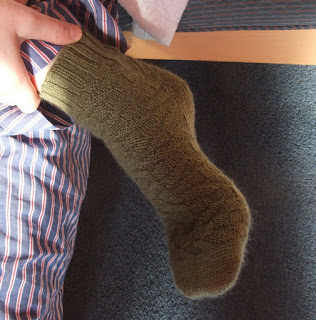On Saturday, I went to a dyeing workshop at
Spun, my local yarn shop. The tutor was Debbie Tomkies, of
DT Craft and Design. It was huge fun - an opportunity to play with colours and messy liquids, with a practical result at the end of it. I was surprised at how easy and quick the dyes are to use - the only dyeing I have done before involved heating pans of dye on the hob, but on Saturday, we only needed to microwave the yarn once it had been soaked in the cold dye.
There were 6 students in the workshop and it was fascinating to see the different ranges of colours that we liked. I kept to greens, blues and purples, but others used very bright colours, yellows and reds.
 |
| Our finished results |
I came home with three small skeins of lace-weight wool and a 100g skein of merino and nylon sock yarn.
I dyed one of the lace-weight skeins in a mixture of greens. I laid out the wet skein on a J-cloth, with a plastic sheet underneath, and squirted the dye directly onto the yarn using a syringe - a satisfyingly reckless process. Then you pat each section of yarn gently so that the adjacent colours mingle and there are no undyed sections.
I dyed the other skeins by putting beakers of mixed dye into a big plastic tub. Then you drape the wet yarn over the beakers, so that as much yarn as possible is immersed in dye - the yarn loops into one beaker, then over into the next beaker and so on. [Why didn't I take a photo?]
I dyed the remaining two lace-weight skeins in purples, blues and greens. I used the same beakers of dye twice, because when the first skein had been dyed, there was still quite a lot of the dye left. I like the more pastel effect a lot - I think another time I would use a weaker dye solution in the first place.
Finally, I dyed the sock yarn using the beaker method with mixtures of red and turquoise dyes, in varying proportions to give a range of purples. Being a very inexpert dyer, it didn't come out quite as I intended. I made the dye solution stronger than I intended, again. And there are some small patches between the different colours where the yarn is sometimes hardly dyed at all, and also some small areas which are pure turquoise with no red at all - maybe I didn't mix the dye thoroughly enough. But I think that the lighter patches are in the end a good thing - otherwise the overall effect would be too dark.
Even if I envisaged a different end-result, I really like how it has turned out in my knitted sample. And the yarn is beautifully soft. I plan to knit a pair of socks with it, and fingerless mittens for me if there is enough left.
It was a really good day - I had fun and learnt a lot. I'll buy some dye from Debbie and try it at home some time (only when I have reduced my stack of half-finished knitting, though).














